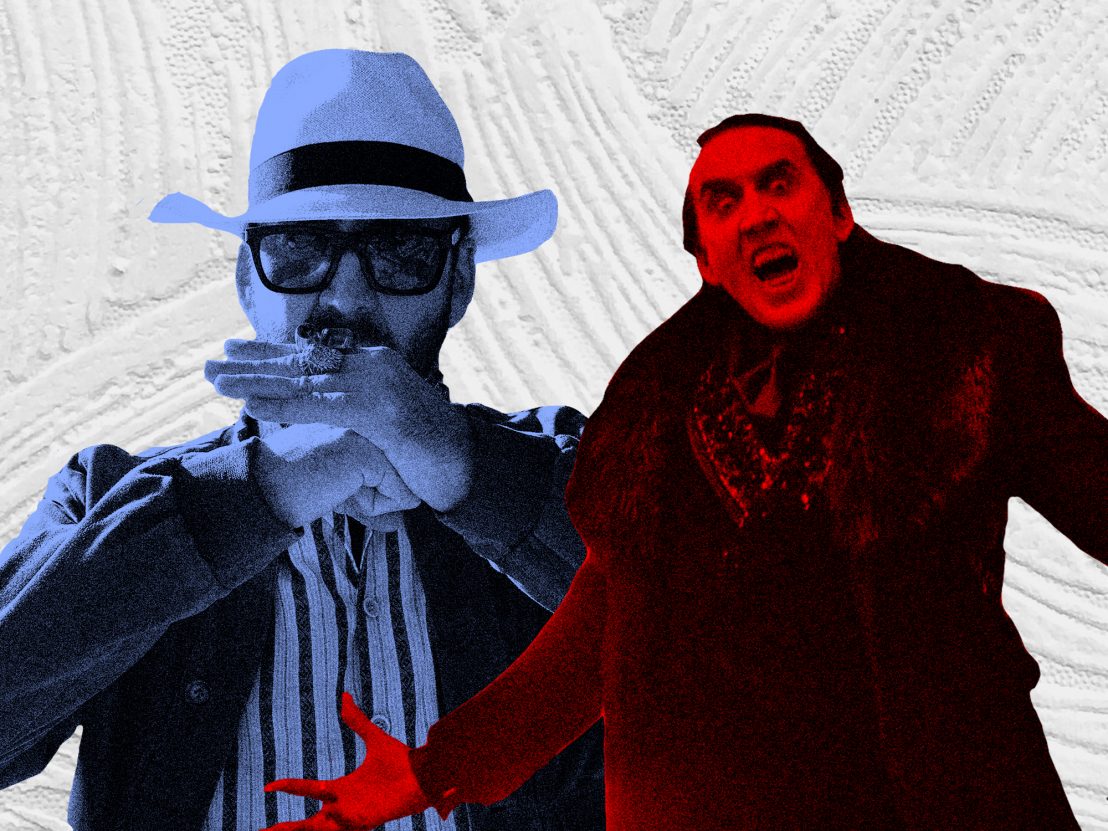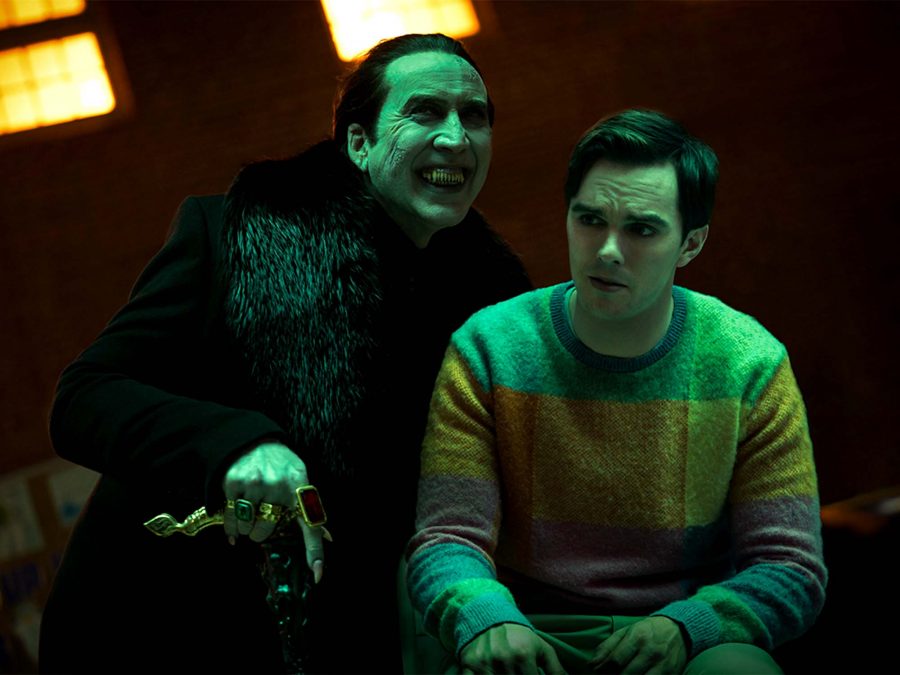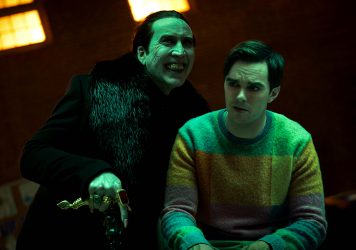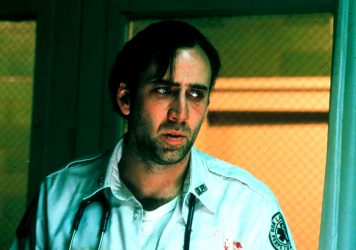
In an interview with Stephen Colbert to promote Renfield, Nicolas Cage listed his top five Nic Cage films: Pig, Mandy, Bringing Out the Dead, Bad Lieutenant, and Joe. No Face/Off, or Con Air, or Raising Arizona, or any of the traditional examples of the zany, wacko performances has been entrenched in meme history – and definitely not Renfield. The roles he picks up showcase best the genuine and robust emotional sincerity he laces through all his roles, with even his viral, mocked highlights being capable of legitimate gravitas.
After his Oscar nomination for his dual turn in Adaptation, the 2000s saw a slip in quality control for Cage, and by the 2010s the frequency of his direct-to-video output had consumed his career. There were the odd blips of stripped-back and artistic projects, but modern Cage was known more for his troubles with the IRS and ‘Cage Rage’ on-screen freakouts than the strengths of his talent.
But then came Mandy, and its LSD-fuelled mission of raw vengeance put Cage back on the map, followed up swiftly with the gently heartbreaking Pig to prove that swine heals all wounds. It was clear Cage’s return to buzzy, brilliant cinema was no fluke but a sincere renaissance. The awards buzz around Pig prompted the usual “redemption arc” rallying cries, even though Cage himself shares no shame about starring in DTV guff. Still, his subsequent return to mainstream fare is welcome – he’s had back-to-back SXSW premieres of studio comedies that, on the surface, tap into his much enjoyed Cage eccentricities.
Playing a pastiched version of himself in Tom Gormican’s The Unbearable Weight of Massive Talent, followed by a heightened, comic version of Dracula seemed like a sure hit. But it came as a crushing disappointment that, despite the passion both films had for Nic Cage’s brand of acting, they were less interested in him channelling anything innovative or nuanced, with their appreciation of Cage not dissimilar to the type you’d find in a YouTube compilation of all his loudest and weirdest moments, devoid of any emotional context or complexity.
To clarify, Cage is terrific in Massive Talent and Renfield. As the prince of darkness, his strange intonation or German expressionist physicality all feels carefully thought through, but there’s a hard ceiling to how good Cage can be when it’s all in service of a bloated, half-baked action-comedy (one strangely lacking in horror) that had twice the budget of Francis Ford Coppola’s much-lambasted depiction of the Transylvanian count.
The fact that casting Nic Cage as Dracula sounds like a no-brainer is ultimately its greatest flaw – it’s such a flashy, tantalising idea that the filmmakers behind Renfield clearly didn’t anticipate needing a complex use for the character. Yes, Cage is reverent to the cinematic history of vampires, but his performance still feels like it belongs to a more daring, inventive film. It’s not that he misunderstood the assignment, rather that Cage gave a more interesting response than the assignment necessarily deserved.

Every year cinema crosses new frontiers of what we thought possible in the medium, but we’re still stuck in a regressive idea of what “good” performances look like. How can we say that every type and shade of emotion can be accessed by the realistic, committed but non-experimental performances that win awards? When we see Cage’s agonizing wails at the hands of cultists in The Wicker Man or his submission to vampirism in Vampire’s Kiss, or even the bug-eyed mania of blurred identities in Face/Off, do we really not recognise that heightened, unhinged performances are accessed with precise, well-honed acting chops, and not just by “going apeshit”?
Neither Massive Talent nor Renfield could have happened if Cage hadn’t been previously co-opted into memedom, with ironic love for the unconventional flattening all the intricacies that he can offer. Until we break out of the habit of seeing the sort of bizarre and amplified performances that Cage deals in as something to laugh at, actors are just going to be disserviced by industries that have already mistreated them.
The monkey’s paw of Cage returning to the mainstream isn’t restricted to Hollywood rejecting the performer’s nuances, but a prioritisation of stultifying and unimaginative comedies that wants to tap into internet-friendly outlandishness glee. After Renfield and Cocaine Bear already in 2023, it’s clear you can’t just pin everything on a harebrained concept and a self-aware tone; they can’t even be saved by dropping more interesting and deserving actors into the middle of them. If this is what Cage will be relegated to now he’s popular again, he might be better served by his 2010 streak – DTV drek doesn’t insult its audience, and Joe and Mandy showed a smaller scale might be the best way for him to explore something profound.
The queasy connotations of the “actor redemption arc” are clear (why is it the mistreated performer who has to redeem themselves with good projects rather than the parameters of the industry that have to change?), but queasier still are the options available to people once Hollywood re-recognises their worth. Asking someone to pantomime a misrepresentation of what makes them compelling just speaks to the limitedness of what variety the mainstream will even permit. Recall Brendan Fraser and Ke Huy Quan’s recent Oscar wins: online clamour for them to return to franchises audiences watched as children reveals a staggering incuriousness about what actors can offer us.
If we weren’t due Cage projects from filmmakers like Oz Perkins and Kristoffer Borgli, the state of the shamanic thespian’s career would set off alarms. Still, his return to studio filmmaking carries a warning: Nic Cage should not be back on anyone else’s terms but Nic Cage’s.
Published 24 Apr 2023

Nicolas Cage plays an out-of-work version of himself in Tom Gormican’s well-meaning but underwhelming meta action-comedy.

Nicholas Hoult plays Count Dracula’s long-suffering servant in Chris McKay’s underwhelming horror-comedy.

The actor is at his intense and emotional best in Martin Scorsese’s underrated late ’90s thriller.